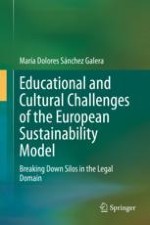2020 | OriginalPaper | Chapter
2. Conceptual and Methodological Premise: Breaking Silos Into the Legal Domain
Author : María Dolores Sánchez Galera
Published in: Educational and Cultural Challenges of the European Sustainability Model
Publisher: Springer International Publishing
Activate our intelligent search to find suitable subject content or patents.
Select sections of text to find matching patents with Artificial Intelligence. powered by
Select sections of text to find additional relevant content using AI-assisted search. powered by
